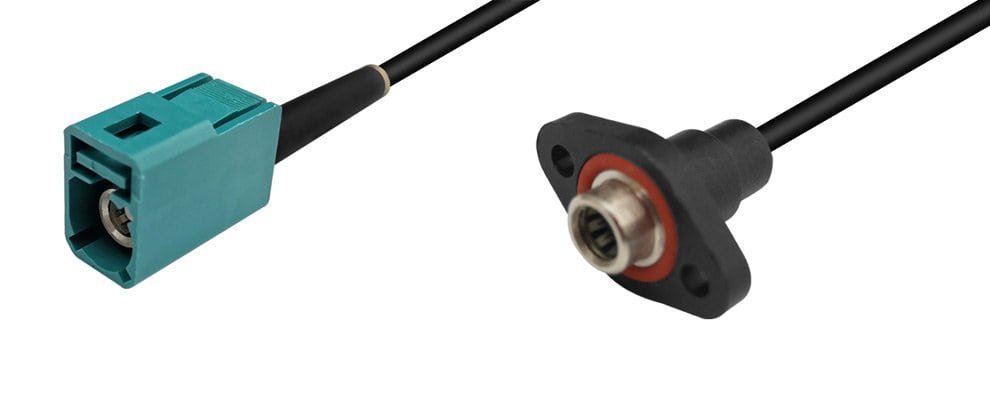Introduction
The Fakra cable assembly revolutionizes automotive RF solutions by providing unique features such as color coding and secure locking mechanisms. Unlike the adaptable yet generic standard coax connectors, Fakra connectors are superior for vehicle-specific uses like antennas and navigation systems. This article explores their distinctions, advantages, and practical applications to assist you in selecting the appropriate connector for your project.
What Makes Fakra Cable Assembly Stand Out?
The Fakra cable assembly is a specialized RF connector tailored for automotive needs. Built on the SMB connector design, it includes a plastic housing with unique features:
- Color Coding: Each Fakra connector type has a distinct color, reducing connection errors.
- Mechanical Locking: Ensures a firm, vibration-resistant fit—crucial for vehicles.
- High-Frequency Support: Handles signals up to 3GHz, ideal for GPS and wireless systems.
These traits make Fakra cables a top choice for automotive engineers seeking reliability and precision.
Understanding Standard Coax Connectors
Standard coax connectors, like BNC or SMA, are the go-to for general RF applications. They’re affordable, widely available, and versatile, supporting a broad range of frequencies. However, they lack the automotive-specific features of Fakra connectors, such as locking mechanisms or error-proof designs, making them less ideal for vehicle environments.
Fakra Cable Assembly vs Standard Coax Connector: A Side-by-Side Comparison
Here’s how they stack up:
- Performance: Fakra cable assemblies are optimized for automotive RF needs (up to 3GHz), while standard coax connectors offer broader frequency flexibility.
- Reliability: The locking and keying of Fakra connectors ensure stability in rugged conditions; standard options may need extra securing.
- Cost: Standard connectors are cheaper, but Fakra cable benefits justify the price in specialized use cases.
- Installation: Color-coded Fakra connector types simplify assembly, unlike standard coax connectors.
For automotive projects, Fakra cables shine; for general use, standard coax suffices.
Where Fakra Connectors Excel in Automotive Applications
Fakra connectors are key in modern vehicles, supporting:
- Antenna Systems: Reliable AM/FM, satellite, and GPS signal transmission.
- Navigation: Clear signals for real-time location tracking.
- Safety Features: Stable connections for backup cameras and sensors.
Their durability and design make them indispensable for automotive innovation.
Real-World Example: Fakra Cable Assembly in Action
A mid-sized automaker recently upgraded its SUV line with Fakra cable assemblies for infotainment and safety systems. By integrating Fakra connectors into GPS, cellular modules, and rear cameras, they cut installation errors by 25% and boosted signal reliability. The color-coded Fakra connector types also reduced assembly time, saving costs and enhancing quality—proof of their value in real-world automotive settings.
Conclusion
Choosing between a Fakra cable assembly featuring a fakra coax connector and a standard coaxial connector depends on specific application requirements. For automotive and mobility applications demanding precision, durability, and standardized keying, Fakra connectors provide superior performance with their specialized design and color-coded system. Standard coax connectors, while cost-effective and versatile for general RF use, fall short in vehicle-specific scenarios where vibration resistance, temperature stability, and secure mating are critical. Evaluate your project’s demands for automotive safety, EMI shielding performance, long-term reliability, and budget considerations. Fakra cable solutions deliver enhanced signal integrity in vehicle networks, supporting infotainment systems, GPS, camera feeds, and ADAS applications while ensuring compliance with automotive environmental and quality standards.

 Coaxial Cable Assembly
Coaxial Cable Assembly Microwave Test Cable
Microwave Test Cable Coaxial RF Connector
Coaxial RF Connector Coaxial RF Adapter
Coaxial RF Adapter Coaxial RF Termination
Coaxial RF Termination Coaxial RF Test Probe
Coaxial RF Test Probe Coaxial RF Attenuator
Coaxial RF Attenuator RF Switches
RF Switches Rotary Joints
Rotary Joints Coaxial RF Power Dividers
Coaxial RF Power Dividers